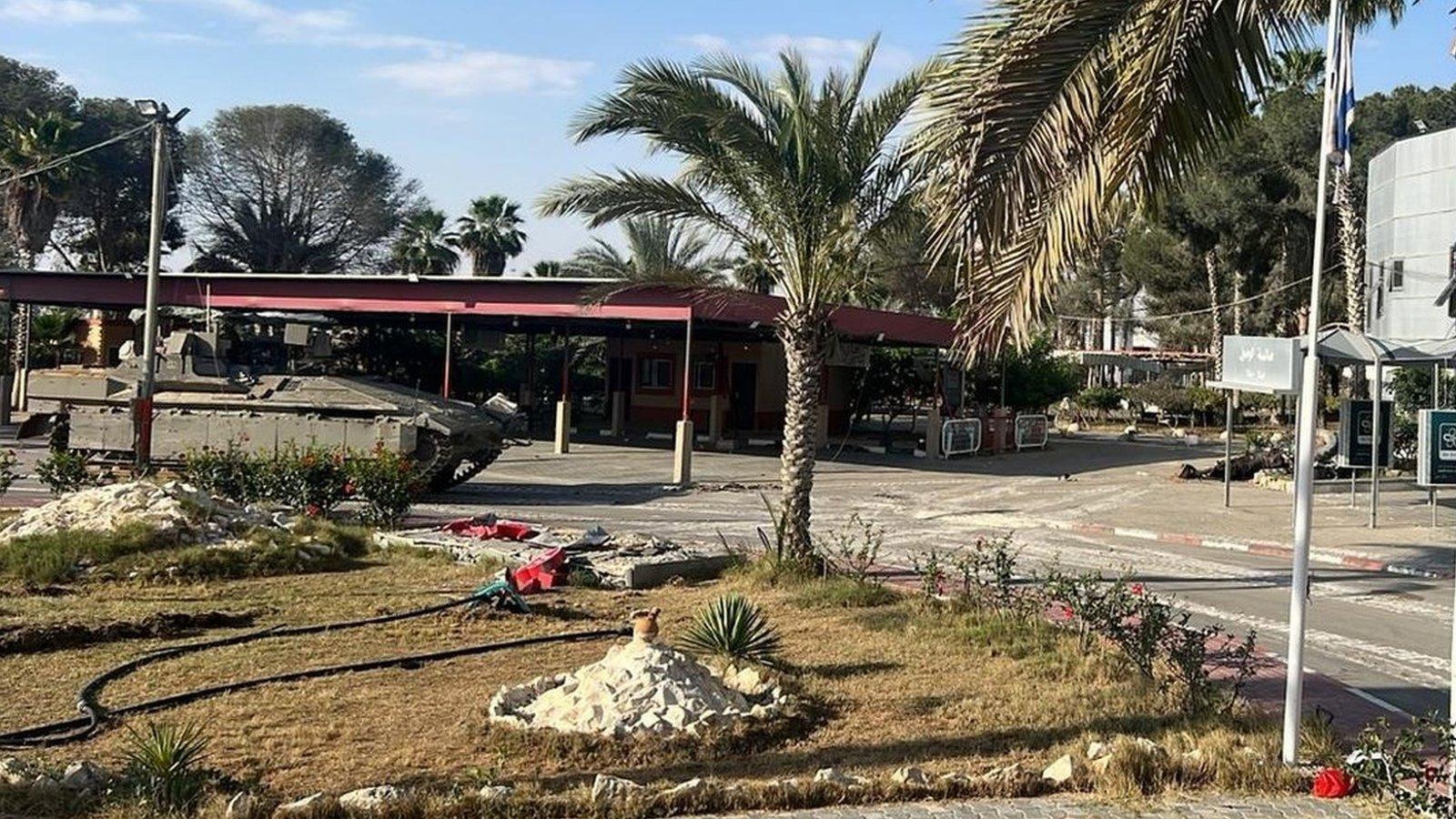Battles in east Rafah amid dispute over reopening of Kerem Shalom crossing
- Published
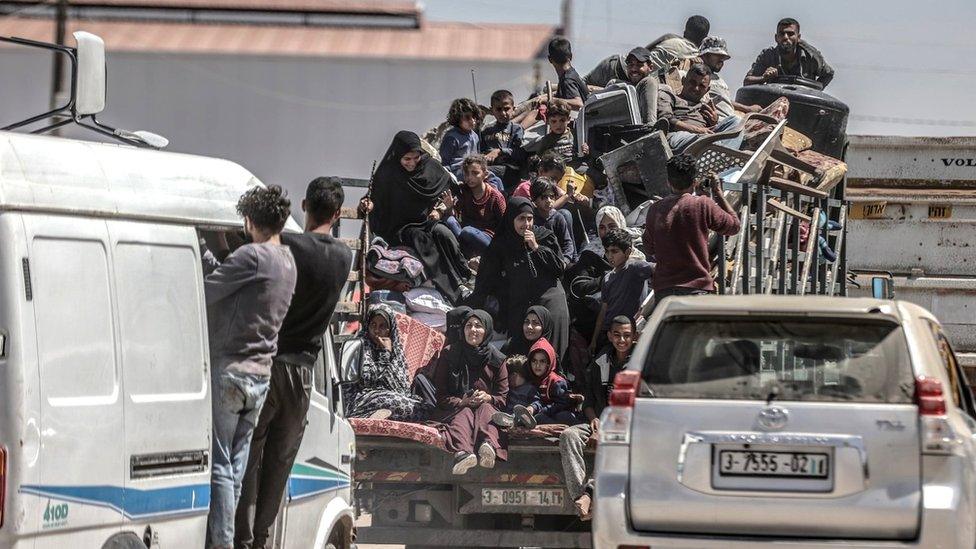
Fighting and bombardment continued on the outskirts of the southern Gaza city of Rafah as Israel said the key Kerem Shalom crossing had reopened for aid.
The Israeli military said troops had killed Hamas fighters in eastern Rafah as part of a "precise" counterterrorism operation. Hamas also reported battles.
Earlier, the military said lorries had reached Kerem Shalom, which was closed after a Hamas rocket attack on Sunday.
But the UN says no supplies have passed through the crossing yet.
The US said that while the crossing was open again, aid could not get through "because of logistical and security concerns" on the ground.
The UN had expressed alarm on Tuesday over what it called Israel's "choking-off" of Gaza's two main aid arteries, after Israeli troops took full control of the Palestinian side of the nearby Rafah crossing with Egypt.
The closing of the Rafah crossing is of particular concern because of the consequences for fuel deliveries - the UN says all of its fuel enters there.
"Without fuel, trucks cannot move critical humanitarian assistance, water pumps will stop functioning and the remaining hospitals will shut down," Philippe Lazzarini, the head of the UN agency for Palestinian refugees, Unrwa, wrote on social media on Wednesday.
World Health Organization head Tedros Adhanom Ghebreyesus warned that hospitals in the south of Gaza had only three days of fuel left.
Plumes of smoke from Israeli air strikes were seen over Rafah and heavy gunfire was heard on Wednesday, as the Israel Defense Forces (IDF) said troops were continuing a limited offensive in eastern areas.
Residents of Rafah reported intense bombardment overnight and video footage on Wednesday morning showed people searching through the rubble of a building destroyed in one of the strikes.
"We are in a safe area according to the army's map - an area without operations," neighbour Reda al-Najili told Reuters news agency.
"We were sitting when suddenly the explosion happened. Our neighbour's house was gone, and our house was all damaged internally. In the house there are only civilians. Women died. Those who were injured were all children."
Palestinian medics also said seven members of one family, including five children, were killed in an overnight strike on a home in the Zeitoun neighbourhood of Gaza City, in the north of the territory.
An IDF statement issued on Wednesday morning said they had "eliminated terrorists and uncovered terrorist infrastructure, as well as underground shafts in several locations" during several encounters over the previous day. They were also carrying out raids on the Gazan side of the Rafah crossing, it added.
The IDF also said aircraft had struck more than 100 "terror targets" throughout Gaza over the same period.
Seven months into its war with Hamas in Gaza, Israel has insisted victory is impossible without taking Rafah.
But with more than a million displaced Palestinians taking refuge there from the fighting elsewhere, the UN and Western powers have warned that an all-out assault could have devastating humanitarian consequences.
Negotiations on a new ceasefire and hostage release deal have resumed in Cairo, with the US saying it believes a revised Hamas proposal could lead to a breakthrough.
The Israeli military played down the significance of the US government's decision to halt a shipment of powerful bombs over concerns that Israel was about to launch a major offensive on Rafah city.
However, US President Joe Biden later warned that the US would stop supplying some weapons if Israel launched a major ground operation in Rafah.
The Israeli military has ordered the evacuation of an estimated 100,000 residents and displaced people in a number of eastern neighbourhoods and told them they will find field hospitals, tents and aid in an "expanded humanitarian area", which stretches north from al-Mawasi to the city of Khan Younis and central town of Deir al-Balah.
Meanwhile, the director general of the World Health Organization said one of the three hospitals in Rafah, al-Najjar, was "no longer functioning due to the ongoing hostilities in its vicinity and the military operation in Rafah".
Dr Tedros Adhanom Ghebreyesus also warned that the partially functioning Kuwaiti and Emirati hospitals would soon run out of fuel unless the UN received a delivery. "Hospitals in the south of Gaza only have three days of fuel left, which means services may soon come to a halt," he added.
The WHO has also said the European Gaza hospital in Khan Younis, where critical patients from Rafah are referred, may also become unreachable.
A displaced man sheltering at the hospital told BBC Arabic's Gaza Today programme that life was very difficult for him.
"I suffer from diabetes, high blood pressure, and osteoarthritis - a matter which means the displacement causes a great deal of suffering for me," he said. "We hope to return to our land in Gaza and that everyone will set up a tent in the place of his home and settle back there."
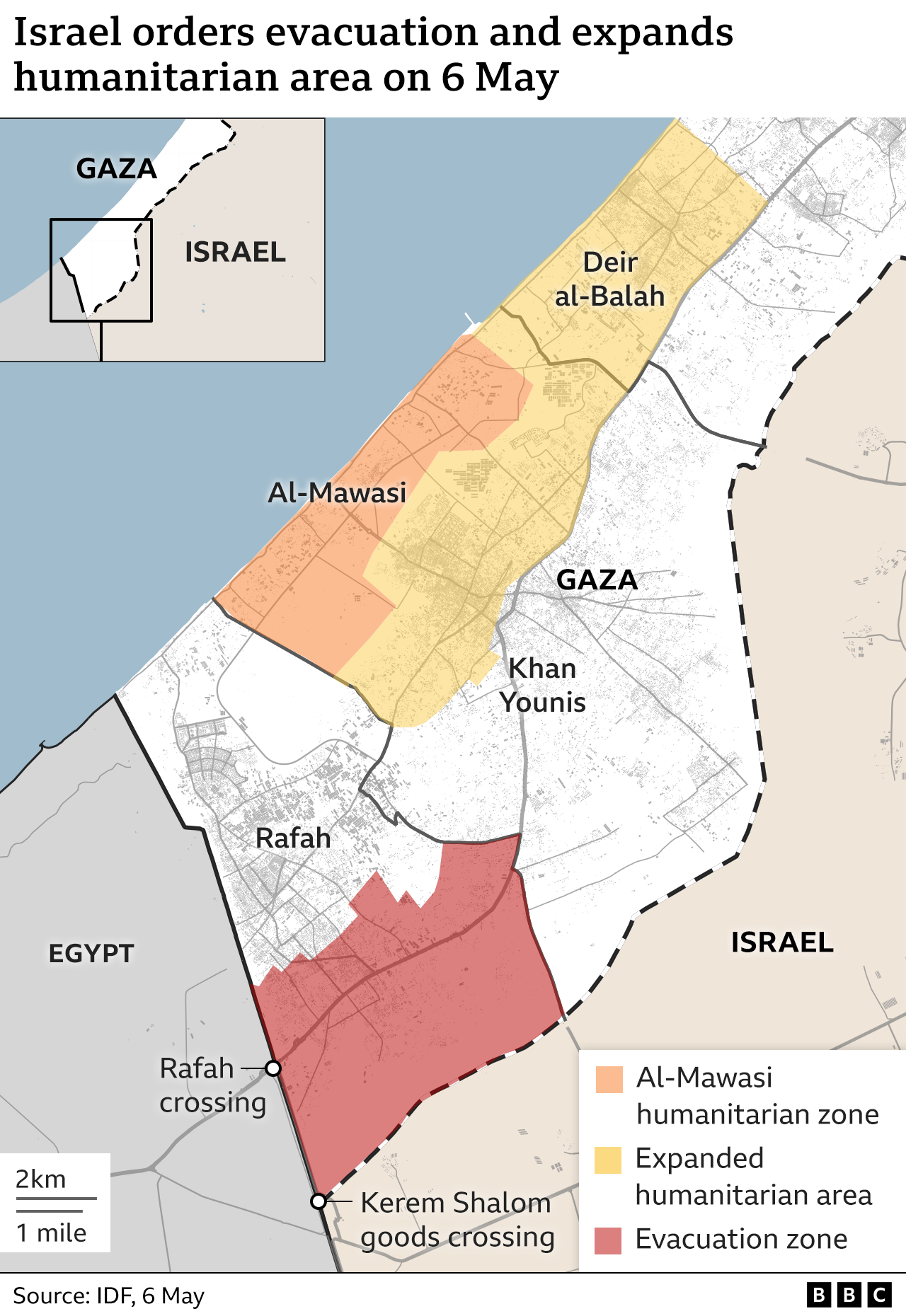
On Wednesday morning, the IDF announced the reopening of Kerem Shalom for humanitarian aid.
"Trucks from Egypt carrying humanitarian aid, including food, water, shelter equipment, medicine and medical equipment donated by the international community are already arriving at the crossing," it said.
"After a thorough security inspection by the security personnel... the equipment will be transferred to the Gazan side of the crossing."
The military also said the recently reopened Erez crossing with northern Gaza was continuing to operate.
However, the UN aid agency for Palestinian refugees, Unrwa - which is the largest humanitarian organisation in Gaza - reported that it had not received any Gaza aid via Kerem Shalom or Rafah, which remains closed.
"We're not receiving any aid into the Gaza Strip, the Rafah crossing area has ongoing military operations - there have been continued bombardments in this area throughout the day," said Scott Anderson, senior deputy director of Unrwa affairs in Gaza.
"No fuel or aid has entered into Gaza Strip and this is disastrous for the humanitarian response."
An Israeli government spokesman disputed Unrwa's assertion and insisted aid was going through Kerem Shalom.
"It is open and I would ask the UN why, day in and day out, there is so much surplus on the Gaza side of Kerem Shalom that is not being distributed," Avi Hyman told a briefing.
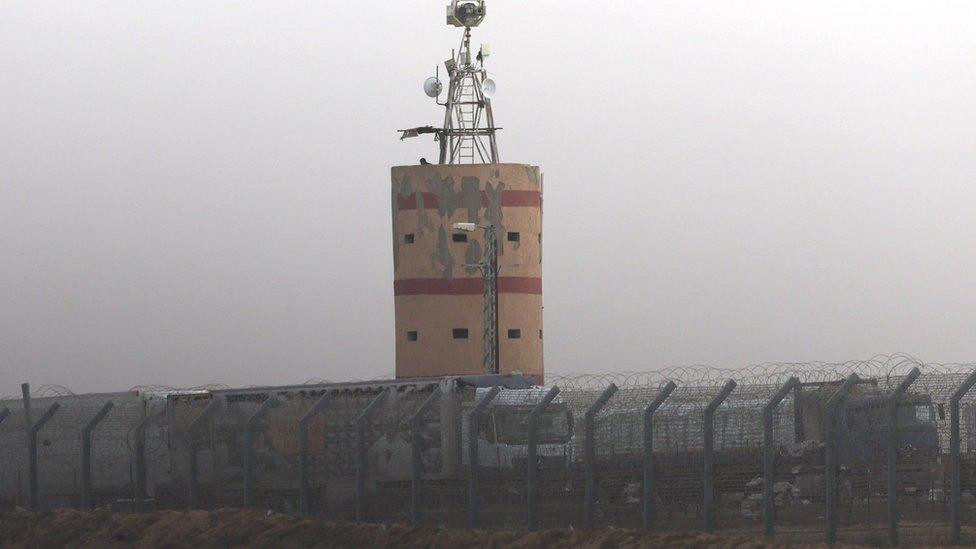
(File photo) The Israeli military said aid lorries from Egypt were already arriving at the Kerem Shalom crossing
Kerem Shalom is the key entry point for aid into Gaza, but Israel closed it on Sunday after four Israeli soldiers were killed by rockets launched by Hamas from the area of the Rafah crossing, according to the Israeli military.
Another six projectiles were fired at Kerem Shalom from the Rafah area on Tuesday, but no casualties were reported.
The second attack happened hours after Israeli tanks rolled into the Palestinian side of the Rafah crossing.
UN Secretary General António Guterres said he was "disturbed and distressed" by the Israeli military activity in Rafah.
He also warned that the closure of both Rafah and Kerem Shalom crossings was "especially damaging to an already dire humanitarian situation" and demanded that they be reopened immediately.
Mr Guterres urged Israel and Hamas to "spare no effort" to agree a ceasefire, warning that the fate of the entire region was facing a "decisive moment".
On Monday, Israel declared that a three-phase proposal for a ceasefire and the release of hostages approved by Hamas was unacceptable.
The White House spokesman, John Kirby, said a revised text Hamas had since put forward suggested remaining gaps could "absolutely be closed".
Israel launched a military campaign in Gaza to destroy Hamas in response to the group's cross-border attack on southern Israel on 7 October, during which about 1,200 people were killed and 252 others were taken hostage.
More than 34,840 people have been killed in Gaza since then, according to the territory's Hamas-run health ministry.
A deal agreed in November saw Hamas release 105 hostages in return for a week-long ceasefire and some 240 Palestinian prisoners in Israeli jails. Israel says 128 hostages are unaccounted for, 36 of whom are presumed dead.
- Published6 May 2024
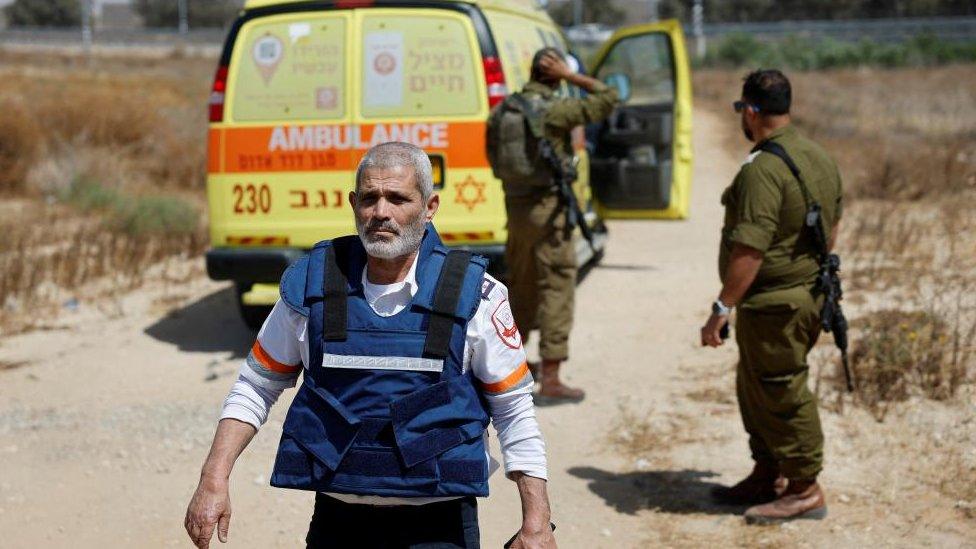
- Published7 May 2024
